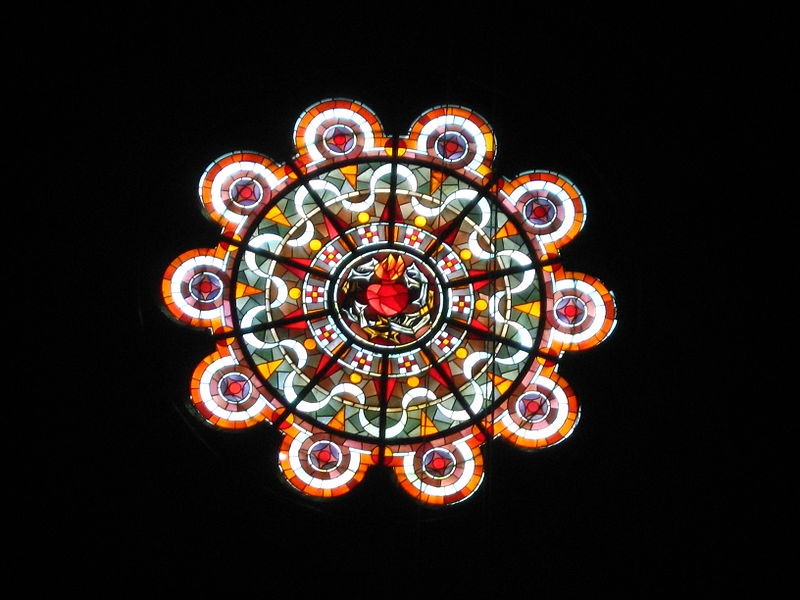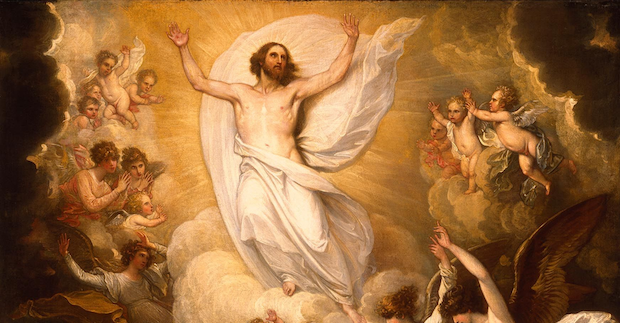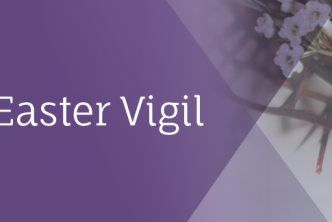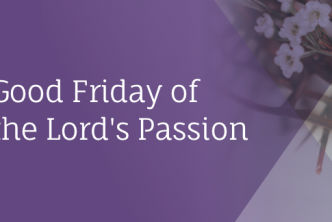The feast of the Sacred Heart was celebrated this year on June 27th, but here is a reflection on the Basilica of the Sacred Heart in Paris. Learn more about the devotion to the Sacred Heart from its founder, St. Mary Margaret Alacoque, and some of its first commentators, in our Sacred Heart Collection.
I had the chance to visit Paris two years ago with my family. I had been a student in France years before, and had always loved the Sacred Heart Basilica.
When I go this time, it’s the week before Palm Sunday. Wandering around the immense church, I light huge candles, and buy books from the bookstore. There are three windows to Joan of Arc in an alcove: “She listens to her voices,” the inscription says.
The stained glass windows still strike me, as they had when I was a student in Paris years ago. Although the Basilica is newer, as churches in France go, the stained glass is in the older, medieval style. Colored pieces of glass make up a larger image, like a collage. The color scheme is different than many other churches I have seen. The windows in the cathedral in Rouen, for example, are made up of blue tones, cool and mysterious. In Sacre Coeur, however, the background pieces are predominantly red. The sun shining through the windows suffuses the Basilica with warmth. Like blood.
Then I see two glassed-in rooms for the sacrament of reconciliation. Fascinated, I watch a man who appears to be an African walk in, sit down on the chair, and start talking to a priest in white vestments. The man is gesticulating wildly. I don’t know if the glass cubicles are ad hoc, an extra sacramental opportunity for Holy Week, but this format elevates face-to-face reconciliation to a new level. Anyone walking by can observe the confessional. It seems unbelievably exposed. But something seizes me; I wait in line and advance to the peculiarly public reconciliation opportunity.
Confession is a French experience, with emphasis on precision, exactitude, and logic. I start making my confession in French and the priest holds up his hand for me to stop. He asks me questions, to locate me on his Gallic mind map:
“What country are you from? What do you do? Why are you here? Are you a student?”
I tell him I was a student in France years ago.
“What do you study?”
I tell him I’m a teacher.
Instead of reeling off a list of deeds and misdeeds, I just tell the priest one thing, an incredibly wounding and painful experience that has left me limping along. I tell him I am tired, discouraged, and impatient with my young son. I tell him that I don’t like the person I see myself turning into.
He considers this, thoughtfully templing his fingers, and says, “You must pray to God that he will give you a new heart.”
“Make an act of contrition,” he continues; then pauses, looking at me: “In your own language.”
Of course: so it would be correct. And in the imperative, “You must.” How many times had I heard that? All aspects of life in France, from buying a metro ticket to choosing a career, are governed by the imperative tense: “It is necessary.”
The penance chafed at me. At the time, I didn’t think much of the heart as a concept or reality. It seemed to me that hearts were untrustworthy. My heart was dead, and better off that way, I thought. I would have said that’s the last thing I needed, that I needed something better, some real help.
But part of reconciliation is letting go of what I think I need and accepting that in order for the Holy Spirit to work, I need to perform the penance asked of me by the priest who has heard my confession. It was a few quiet moments in the pew saying my prayer before I left the church, but from the vantage point of two years, I can see that my heart has been healed and restored in ways that I never expected.
Now, I see that the Holy Spirit flows under the stones of Montmartre like the blood that flows silently, steadily throughout my body, back and forth, and through the church, drawing me and other believers all over the world together, flushing us out of our eddies of isolation. It is active outside of time, like the heart of Joan of Arc that they say still beats at the bottom of the Seine River in Rouen. It flows through time, to where Ignatius and Peter Xavier are praying for guidance about their new religious order on the hillside where the Basilica now stands. The Spirit is the blood of the church, sustaining it, transforming and healing our wounds, bringing us back to the source. Most of all, the Spirit circulates to perform the work of God, who says:
So will My word be which goes forth from My mouth; it will not return to Me empty, without accomplishing what I desire, and without succeeding in the matter for which I sent it.
(Isaiah 55:11)






